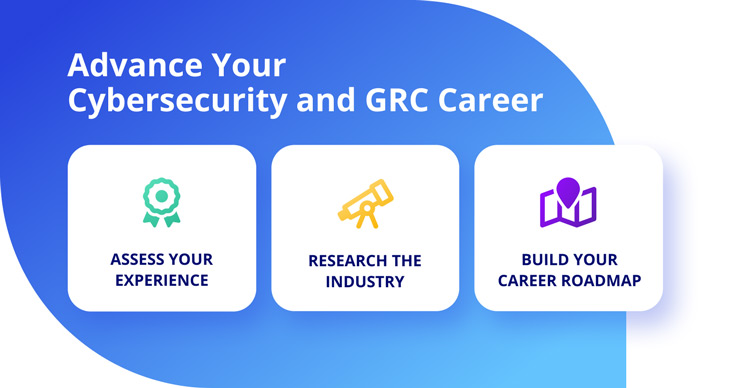
The demands and pressure on GRC and cybersecurity professionals are increasing more than ever before, which means teams need to expand and grow to keep up. However, companies are finding it difficult to fill their open positions with skilled staff. In fact, 80% of GRC and IT security professionals agree that their cybersecurity and risk teams are understaffed, found the 2023 RiskOptics Cyber Risk Viewpoints Report.
What does this mean for you? If you’ve ever thought about pursuing or advancing your career in GRC or cybersecurity, now is a great time to jump into this high-demand field.
Here’s an actionable guide to enhancing your expertise, positioning yourself for success and accelerating your career progression.
How to Advance Your GRC or Cybersecurity Career
One of the things I’ve found over the years is that IT tends to collect unconventional learners who are drawn to working in technology. Cybersecurity and GRC, in particular, are fields that benefit from people with diverse backgrounds and ways of thinking. We need to constantly find new ways to tackle emerging threats, regulations, vulnerabilities and cyber risks. And having those differing viewpoints allows for greater innovation and more creative solutions.
GRC and cybersecurity are also fields where soft skills play an important role in your success — more so than nearly any other positions in IT — because you have to be able to communicate and collaborate effectively to achieve your program’s objectives.
With that in mind, here are some steps you can take to position yourself for success.

Step 1: Assess Your GRC or Cybersecurity Experience
Understanding your strengths, expertise and preferred cybersecurity risk management opportunities is an important first step because it helps you find and prioritize the right opportunities for your personality, lifestyle and career path. You can tackle this with a three-pronged approach.
-
Examine Your Strengths and Weaknesses
Do an assessment to understand your strengths and weaknesses. What are you really good at? What industries do you have a lot of experience working in? And what skills have you developed that you’re an expert in?
But don’t stop at a self-assessment.
Pull in people who know you (family, friends, coworkers, etc.) to give you an outsider’s perspective on where they see you excel. I can guarantee that you’ll learn something new about yourself.
-
Determine Your Transferable Skills
These are things that you’re good at that easily transfer over to other roles. They could be technical skills (like being proficient in Word or Excel), but they can also be soft skills.
Soft skills are highly underrated and immensely important in the world of cyber risk management. Do you collaborate well? Do you have emotional intelligence? Do you excel at leading teams? Can you break down complex ideas and jargon for a non-technical audience?
Make sure to include skills you’ve cultivated with volunteering, hobbies and other activities outside of work.
-
Identify Where You Thrive
Think about what you enjoyed about your previous experiences and what you’d like to do again — especially in jobs that you found particularly challenging.
- Do you thrive in high-pressure situations or enjoy taking your time and doing a deep dive to get a thorough understanding?
- Did you enjoy team collaboration or prefer autonomy and asynchronous communication?
- What tasks or projects were you involved in that lit a fire within you?
Understanding what types of work you’re drawn to will help you determine which types of opportunities to seek in the future and, ultimately, your ideal career trajectory.
Step 2: Research the GRC or Cybersecurity Industry
GRC and cybersecurity are new fields in the sphere of IT, and the opportunities within them are vast and diverse. Depending on what your interests are, there are opportunities for all sorts of skill sets, backgrounds and personalities. So, it’s important to take time to explore what’s out there.
For example:
- If you have a more technical background (e.g. networking or software development), maybe you want to look into being an IT security analyst.
- If you enjoy training others and breaking down complex concepts to be easily understood, security awareness may be your jam.
- If you like making rules and processes, governance could be the right fit for you.
- Maybe you have the right combination of cybersecurity knowledge, emotional intelligence and collaborative capabilities — making you the perfect fit for an InfoSec Manager or Director.
All GRC and cybersecurity positions require a fundamental understanding of IT but the necessary skill sets can vary by role. And if you don’t have the skills necessary for your dream job, being enthusiastic and willing to learn can help you build a bridge to get there.
Step 3: Build Your Career Roadmap Based on Your Interests
Once you have an idea of where you are now, combine it with your industry knowledge to determine where you want to go.
One thing that I’ve learned along the way is that opportunities and recognition rarely drop into your lap. It’s much more productive to put yourself in the driver’s seat of your career and seek out opportunities to expand and direct your knowledge.
Here are specific steps to consider:
-
Look for Opportunities to Enhance Your Knowledge
Build your knowledge in a specialized area of GRC or cybersecurity that you’re interested in pursuing, such as regulatory compliance, risk management frameworks or data privacy.
Resources abound if you look for them: you can find books, articles, events, online courses and even YouTube videos that help you deepen your knowledge and expertise.
-
Expand Your GRC or Cybersecurity Experience
Get GRC or cybersecurity experience beyond your current role. For example, take on cross-functional projects or assignments that allow you to collaborate with other colleagues from different departments, such as legal, finance or IT.
Try to find opportunities to shadow someone currently working in GRC or cybersecurity, get involved with global projects, gain exposure in different industry sectors or get hands-on experience with different types of technology. Not only will this help you fill in the gaps to be successful in advancing your career, but it will demonstrate your versatility, adaptability and willingness to learn.
-
Stay Up-to-Date with GRC or Cybersecurity Trends
Keep your knowledge of industry trends, best practices and emerging technologies current by attending conferences, seminars and webinars.
The landscape is evolving rapidly, driven by technological advancements and the increasing importance of data analytics. You’ll need both technical aptitude and analytical skills to navigate the complex worlds of cybersecurity and GRC effectively.
-
Build a Strong Professional Network
Like-minded professionals can help you gain insight into the industry and advance your GRC or cybersecurity career. Add them to your network by joining industry associations and local chapters, going to industry events, finding opportunities to co-work or volunteer with like-minded professionals and participating in platforms like LinkedIn.
-
Take Your GRC or Cybersecurity Career to the Next Level
Research certifications to determine which one is appropriate for your skill set, level of experience and career path. You’ll want to check out three organizations: CompTIA, ISACA and ISC2, as they provide industry-recognized certifications for security and risk (among other specialties).
Being certified is a way to demonstrate your expertise and open yourself up to more professional opportunities down the road.
-
Develop Your Communication Skills
As you progress in your career, honing your communication skills becomes increasingly important.
Being able to explain how risk impacts your organization’s business objectives can help leaders understand what areas of the business carry the highest risk, why it’s important to invest in cybersecurity and GRC and how those investments enable innovation and growth.
Knowing how to talk about cyber risk in a way that senior management and board members will understand can also significantly impact your ability to advance and influence within your organization.
Set Yourself Up for GRC or Cybersecurity Career Success
Advancing your career in GRC or cybersecurity requires a proactive approach and a commitment to continuous improvement: from refining your skill set to seeking constant learning opportunities and broadening your experience. You’ll also want to build a strong professional network, develop your communication skills and embrace technology like the ZenGRC, so you can position yourself for success in this field.
Career advancement is a journey, and consistent effort and dedication can help you unlock new opportunities and reach new heights as a GRC or cybersecurity professional.
Check out our careers page to see if there’s anything that fits your interests.



